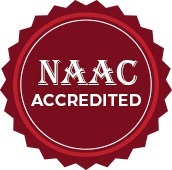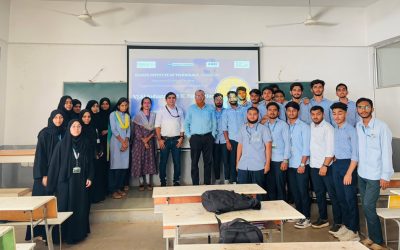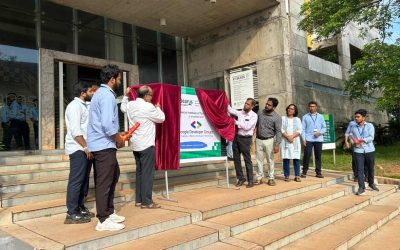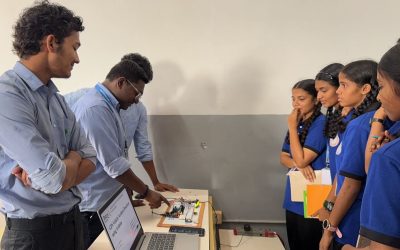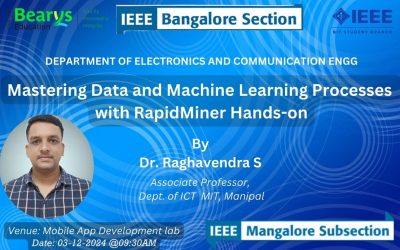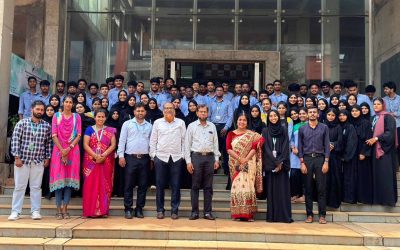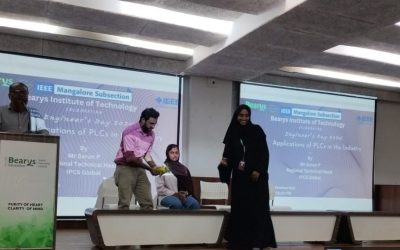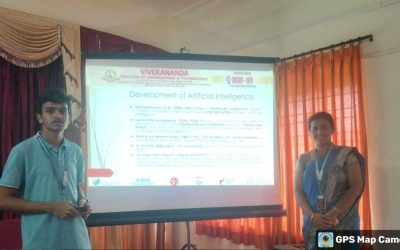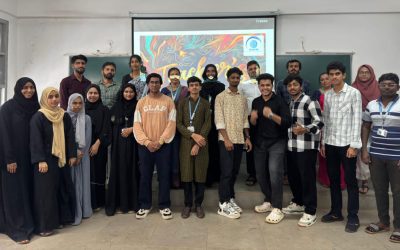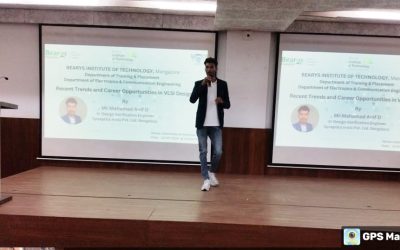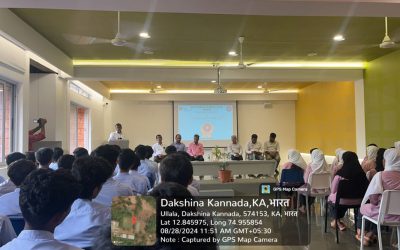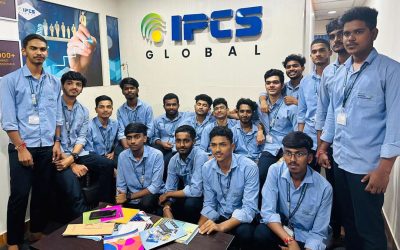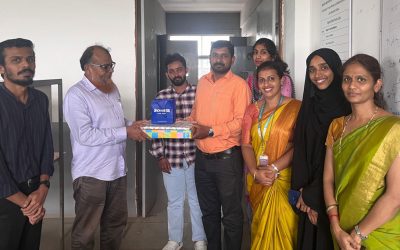Department of ELECTRONICS & COMMUNICATION Engineering

VISION
MISSION
2. To nurture the spirit of innovation and creativity in niche areas of technology among faculty and students by providing state-of-art research facilities.
3. To provide ethical and value- based education by emphasizing multi-disciplinary activities to address the societal needs and environmental sustainability.
VISION
2. To nurture the spirit of innovation and creativity in niche areas of technology among faculty and students by providing state-of-art research facilities.
3. To provide ethical and value- based education by emphasizing multi-disciplinary activities to address the societal needs and environmental sustainability
PROGRAM OUTCOMES (POs)

1. Engineering Knowledge
Apply the knowledge of mathematics, science, engineering fundamentals, and an engineering specialization to the solution of complex engineering problems.
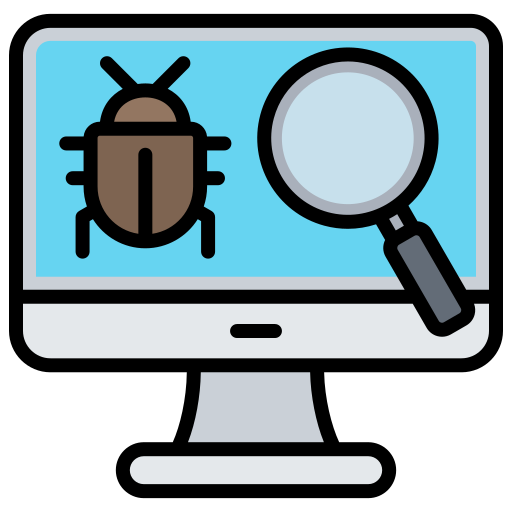
2. Problem analysis
Identify, formulate, review research literature, and analyse complex engineering problems reaching substantiated conclusions using first principles of mathematics, natural sciences, and engineering sciences.

3. Design/ Development of Solutions
Design solutions for complex engineering problems and design system components or processes that meet the specified needs with appropriate consideration for the public health and safety, and the cultural, societal, and environmental considerations.

4. Conduct investigations of complex problems
Use research-based knowledge and research methods including design of experiments, analysis and interpretation of data, and synthesis of the information to provide valid conclusions.

5. Modern Tool Usage
Create, select, and apply appropriate techniques, resources, and modern engineering and IT tools including prediction and modelling to complex engineering activities with an understanding of the limitations.
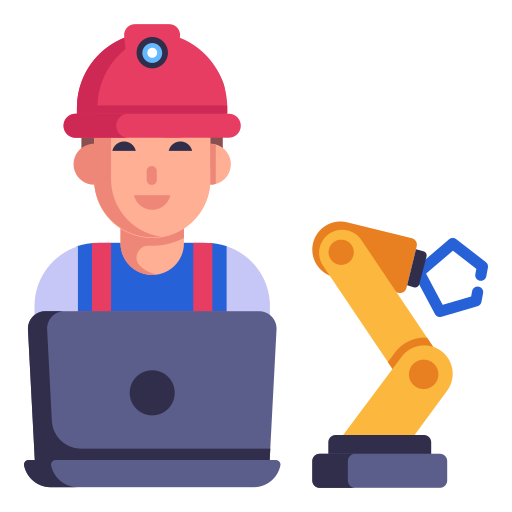
6. The Engineer and Society
Apply reasoning informed by the contextual knowledge to assess societal, health, safety, legal and cultural issues and the consequent responsibilities relevant to the professional engineering practice.
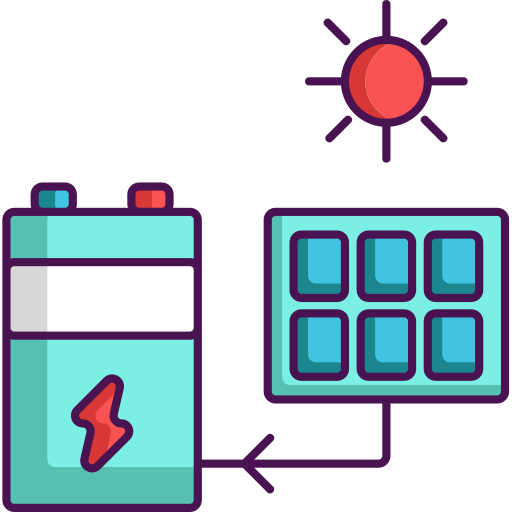
7. Environment and Sustainability
Understand the impact of the professional engineering solutions in societal and environmental contexts, and demonstrate the knowledge of, and need for sustainable development.

8. Ethics
Apply ethical principles and commit to professional ethics and responsibilities and norms of the engineering practice.

9. Individual and Team Work
Function effectively as an individual, and as a member or leader in diverse teams, and in multidisciplinary settings.

10. Communication
Communicate effectively on complex engineering activities with the engineering community and with society at large, such as, being able to comprehend and write effective reports and design documentation, make effective presentations, and give and receive clear instructions.
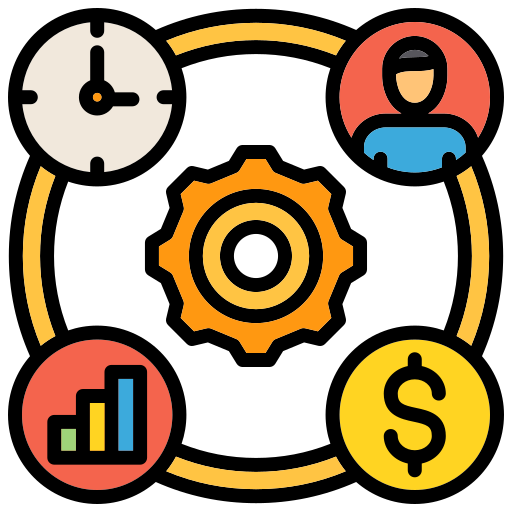
11. Project Management and Finance
Demonstrate knowledge and understanding of the engineering and management principles and apply these to one’s own work, as a member and leader in a team, to manage projects and in multidisciplinary environments.

12. Life-long learning
Recognize the need for, and have the preparation and ability to engage in independent and life-long learning in the broadest context of technological change.
Program Specific Outcomes (PSOs):
1. To design, analyze and implement hardware- software systems for signal processing, communication, VLSI and embedded systems for the given functionality and specifications.
2. To develop professional skills to address ethical, societal and environmental challenges and to efficiently manage projects in multidisciplinary areas
COURSE OUTCOMES (COs)
Bachelor of Engineering
2022 Scheme
ELECTRONICS & COMMUNICATION Engineering
2021 Scheme
ELECTRONICS & COMMUNICATION Engineering
2018 Scheme
ELECTRONICS & COMMUNICATION Engineering
Established in 2009, The Electronics and Communication Engineering Department at BIT offers the bachelor’s degree program. Our dedicated faculty interact closely with alumni in academia and the global industry in order to design programs to meet the aspirations of students. The department is equipped with state-of-the-art infrastructure and equipment. The students of the department are highly innovative and have won several laurels. The department has maintained an excellent placement record of above 95%. Various alumni of the department occupy key positions in the industry and are successful as entrepreneurs.
Our Faculty
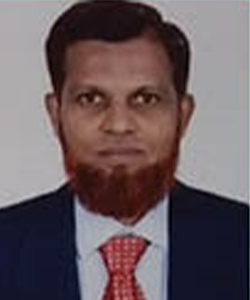
Dr. S I Manjur Basha
Teaching exp. 27 years,
Industry exp. 6 years.
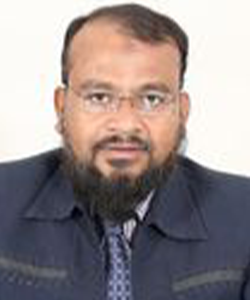
Dr. Abdullah Gubbi
Teaching exp. 21 years,
Industry exp. 8 years.
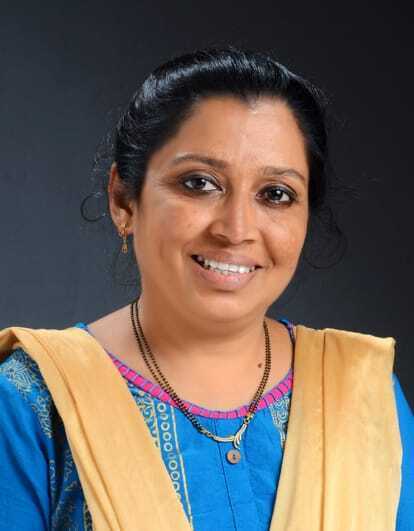
Mrs. Mubeena Parveen
Teaching and Technical exp. 27 years.
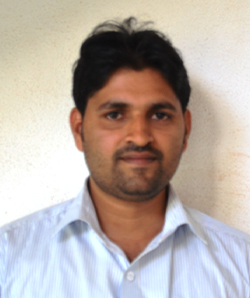
Mr. Abdul Jabbar H
Teaching exp. 13 years.
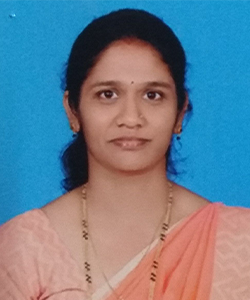
Mrs. Rashmi A V
Teaching exp. 11 years.
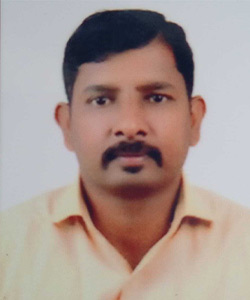
Mr. Jeevan N D
Teaching exp. 7 years.

Mrs. Nikhitha C
Teaching exp. 3 years.

Mr. Sujay K
Industry exp 4 months
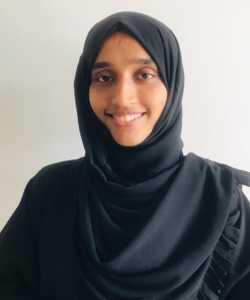
Fathimath Fameeza
Mtech (VLSI and Embedded system)
Experience: 4 years 4 months
Technical Staff
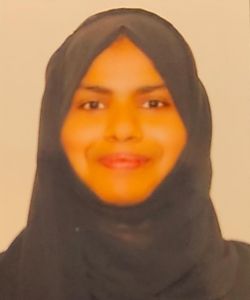
Kaulath Beebi
Experience: 1 year

Vinay
Experience: 1 year

Vidyalakshmi M
1. Analog Electronics Laboratory
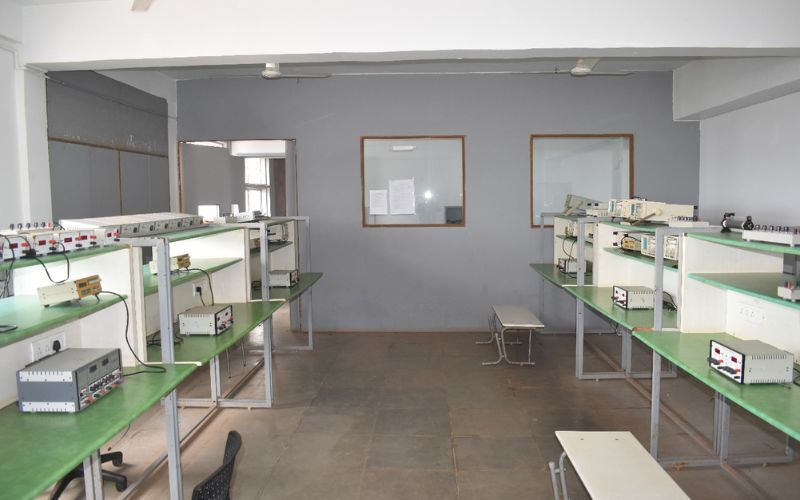
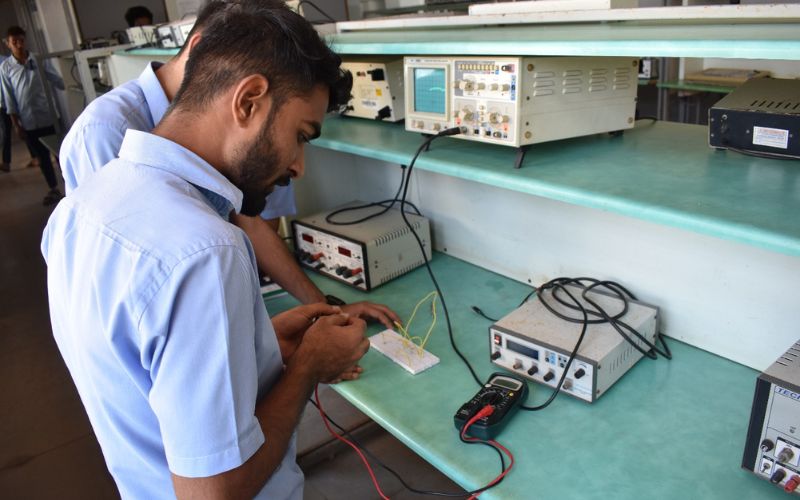
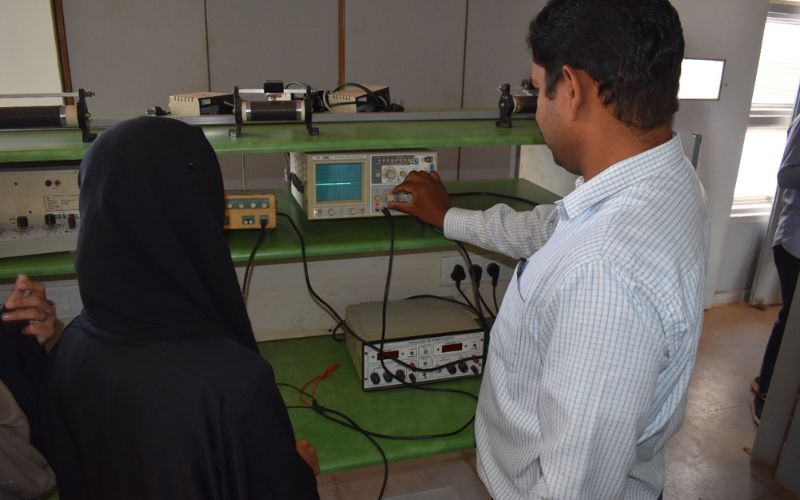
The objective of this laboratory is to link the theoretical concepts of different analog electronic circuits and their different practical implementation feasibility and thereby giving them a scope to learn electronic circuits and their different electrical characteristics. The main equipment’s in the lab include, Function Generator, CRO, DC Power Supply, Digital Storage Oscilloscope.
2. Basic Electrical Laboratory
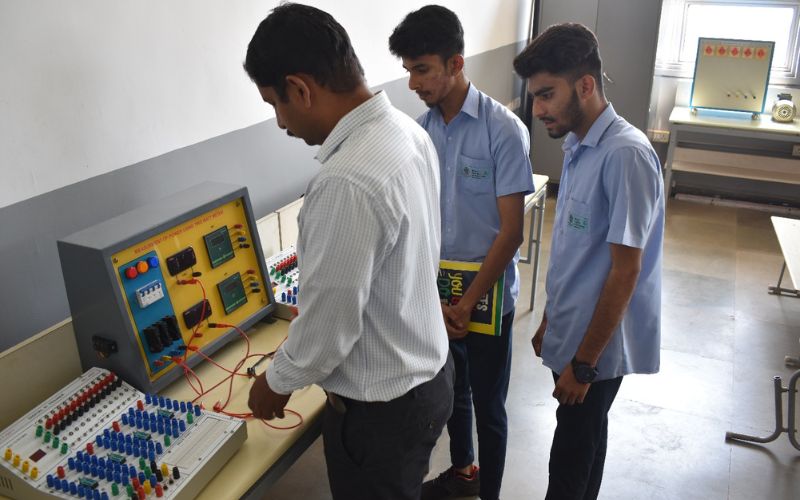
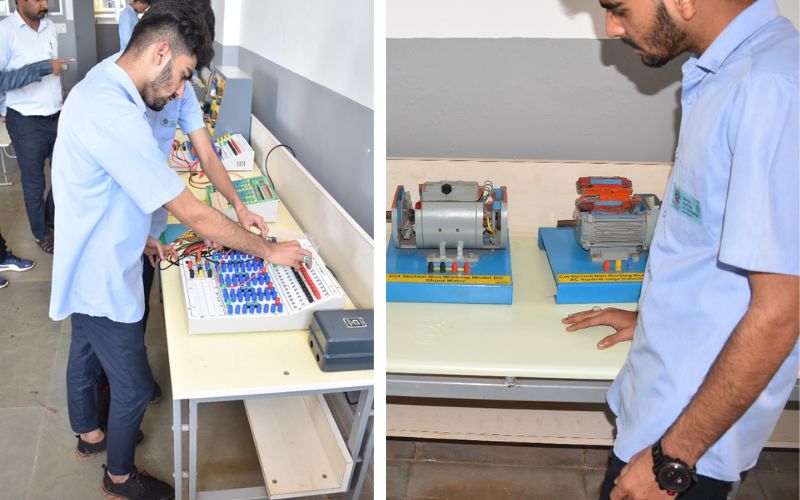
The Electrical Engineering laboratory is one of the important lab of the department as it helps the students of all engineering disciplines to perform the experiments based on basic concepts of electrical science. It is well-equipped with several experimental setups packages for real time experiments. In this lab, the students of all engineering streams are trained on basic concepts of electrical engineering such as AC and DC machines, transformers, verification of basic laws and theorems. The concepts of domestic wiring are learnt with the help of practical implementation.
3. Computer Laboratory
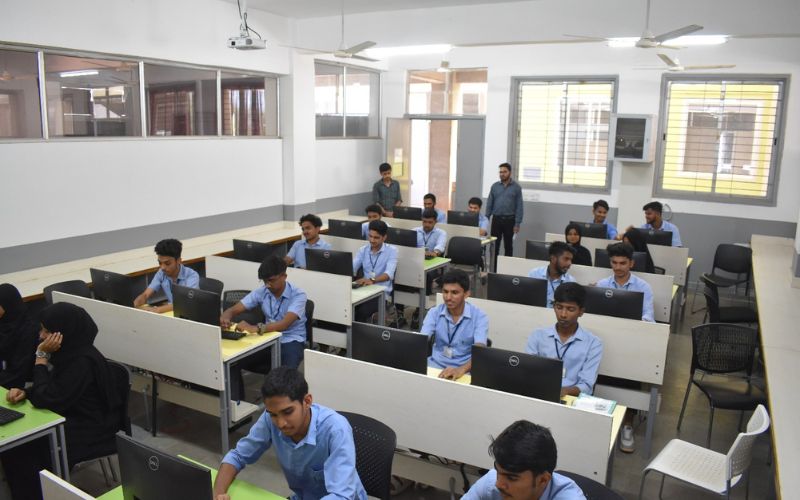
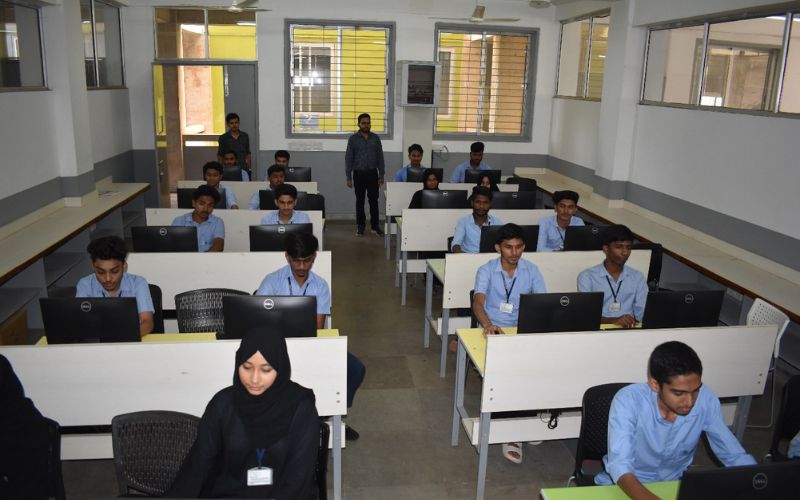
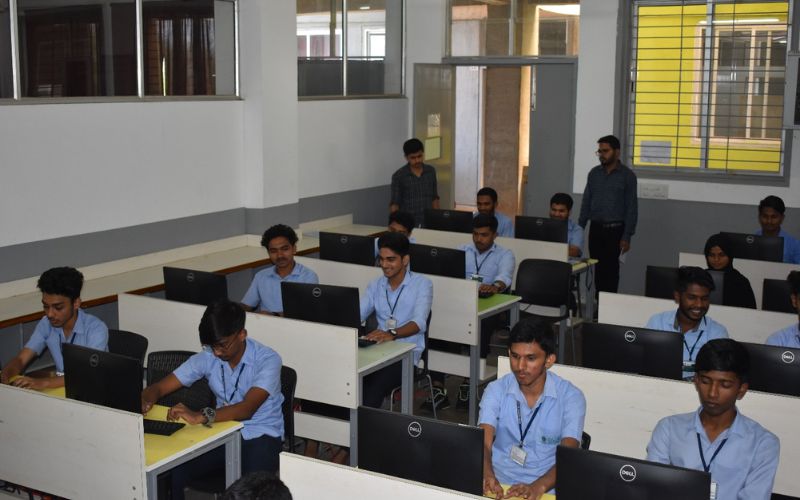
The objective of this laboratory is to provide students with a vast array of I.T resources needed to promote learning. It also enhances the classroom teaching with Internet based real time online re-searchable study environment for the students. It incorporates latest software’s, hardware and networking solutions. The lab is well equipped with Multi-media projector. Internet Connections and capability to Web browsing.
4. VLSI Laboratory
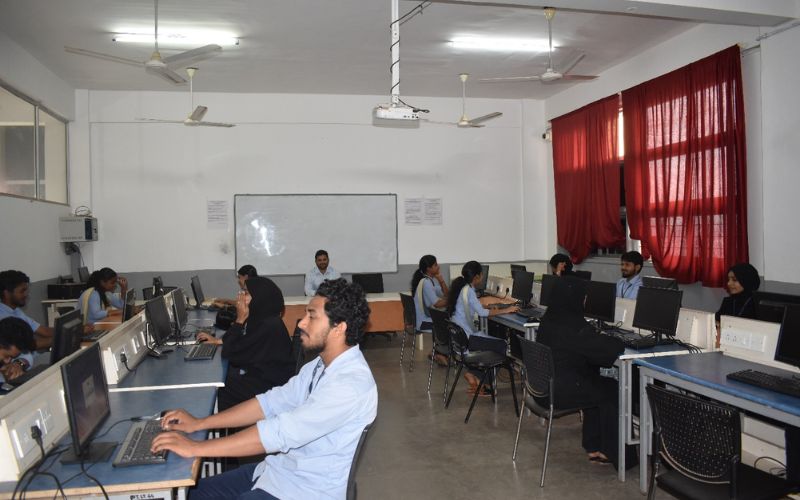
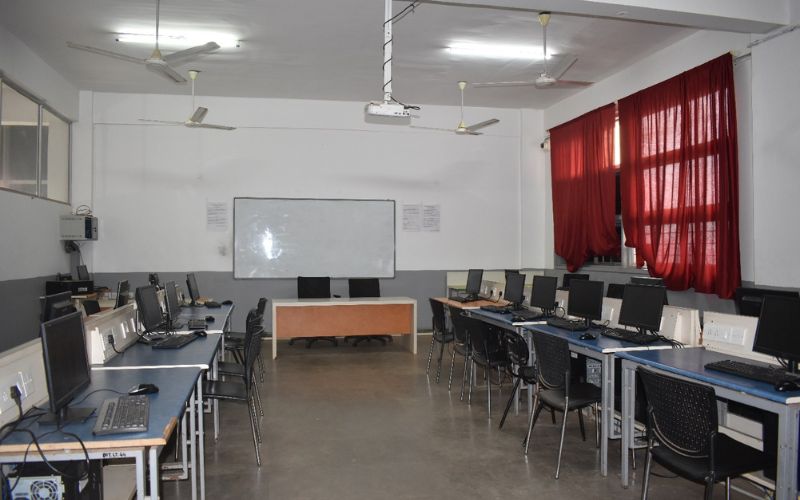
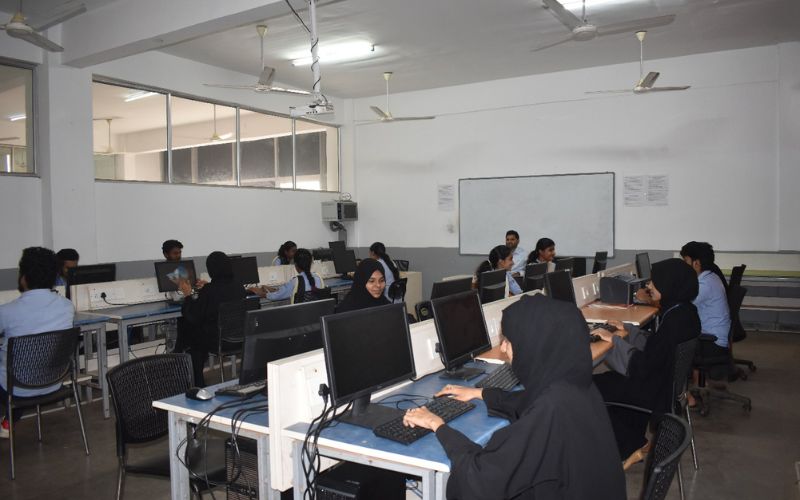
This Lab is used for conducting the practical’s, research activities and to provide hands on design experience with professional design (EDA) platforms. This lab also familiarizes implementation of logical modules on FPGAs. This Laboratory has Licensed Cadence software for VLSI design program. The main components in the lab include VDHL kit.
5. Digital Electronics Laboratory
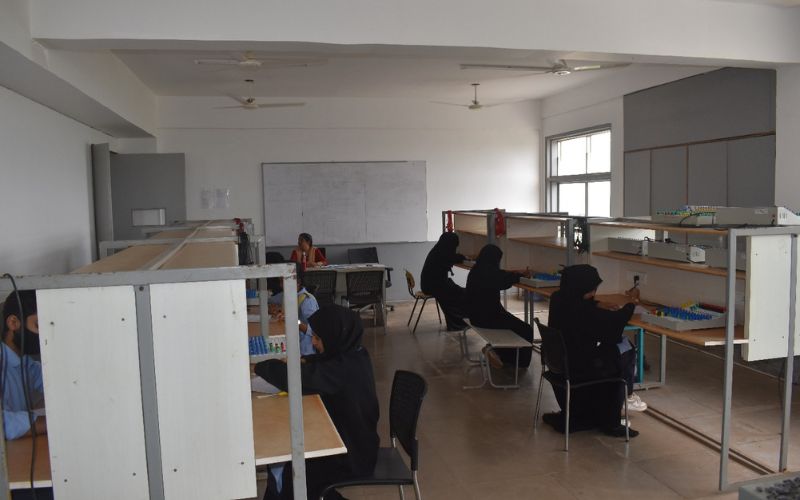
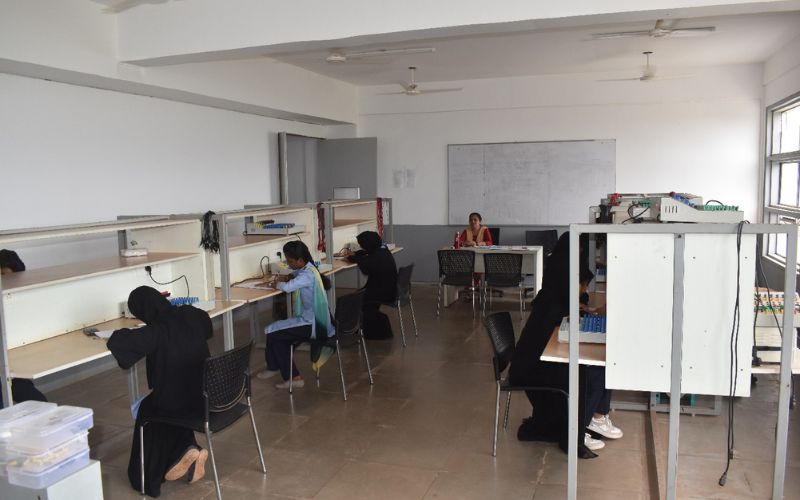
This laboratory enables the undergraduate students to learn the basic concepts and techniques in digital electronic circuits and systems. The learning objective of this laboratory is to supplement the theory program of digital electronics with adequate introduction to both combinatorial and sequential logic circuits, such as, adders, subtractors, comparator, multiplexer/demultiplexer, encoders/decoders, 7-segment display and decoder/driver, flip-flop, register, counter, etc. and various combinations of these. The main components in the lab include digital IC trainer, digital IC tester.
6. Microcontroller and Embedded Systems Laboratory
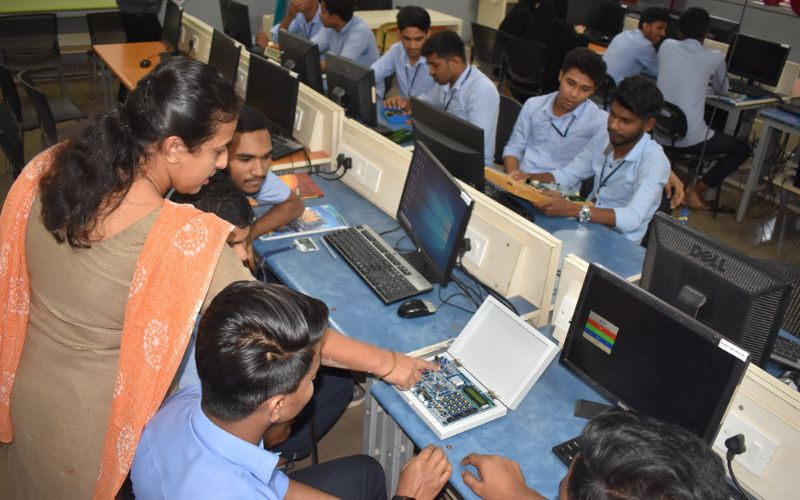
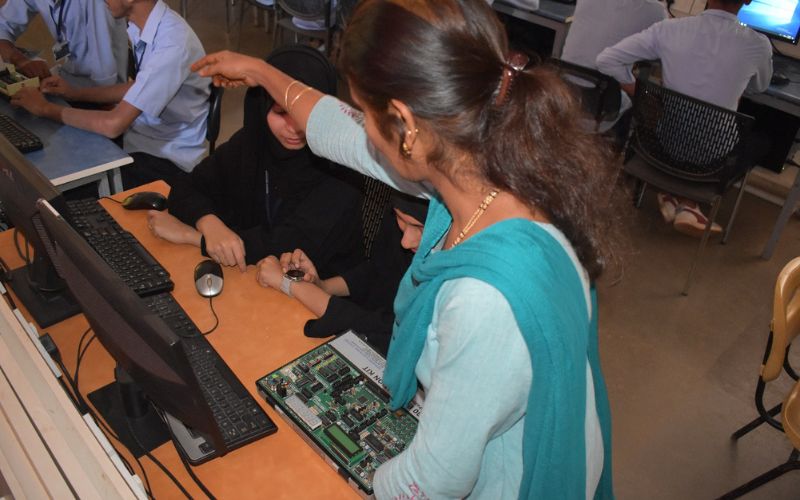
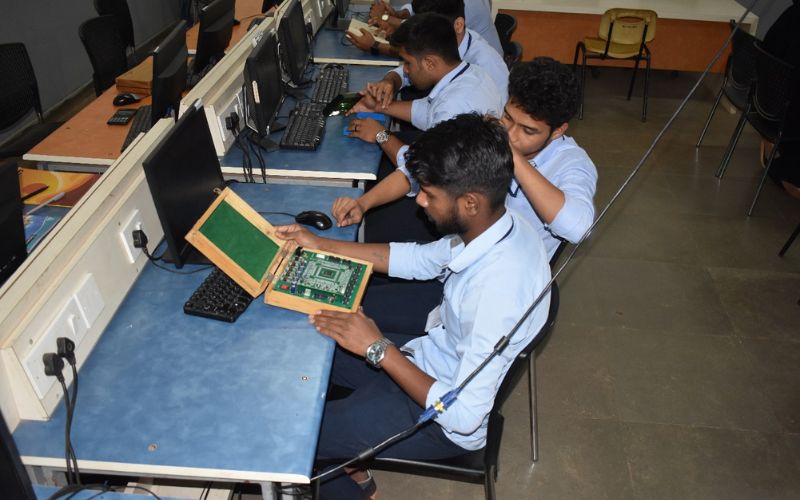
The objective of this lab is to impart skill (both Programming-Assembly level & Hardware) in designing microcomputer systems. This Lab has 8086 microprocessor trainer kits and 8051 micro controller trainer kits, PIC 18 & ARM7 LPC Development boards along with interfacing modules to demonstrate the detailed applications of microprocessors & microcontrollers. The facilities in the laboratory enable students to build a firm background in microcomputer hardware as well as software. Students learn about assembly language programming, memory and I/O design, interfacing of programmable chips and peripherals such as stepper motors, analog – to – digital and digital – to – analog converters etc.
7. Communication Engineering Laboratory
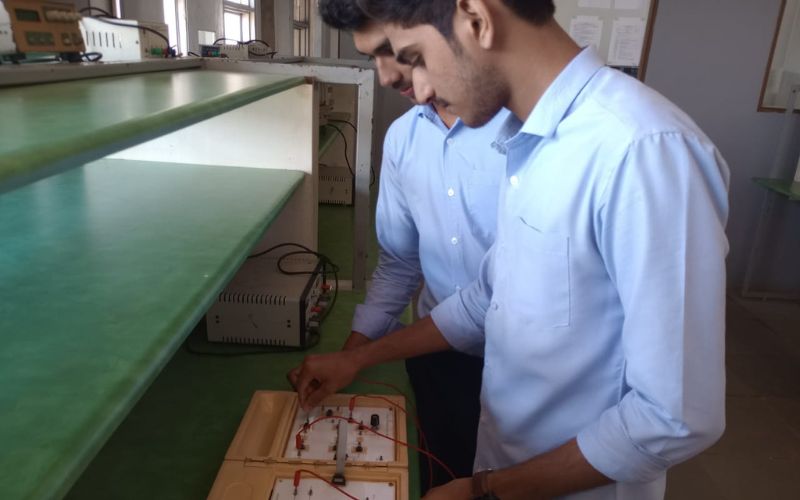
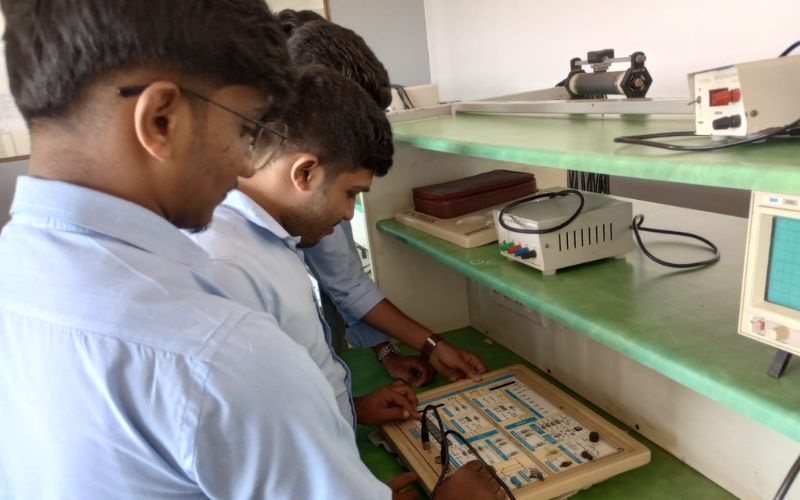
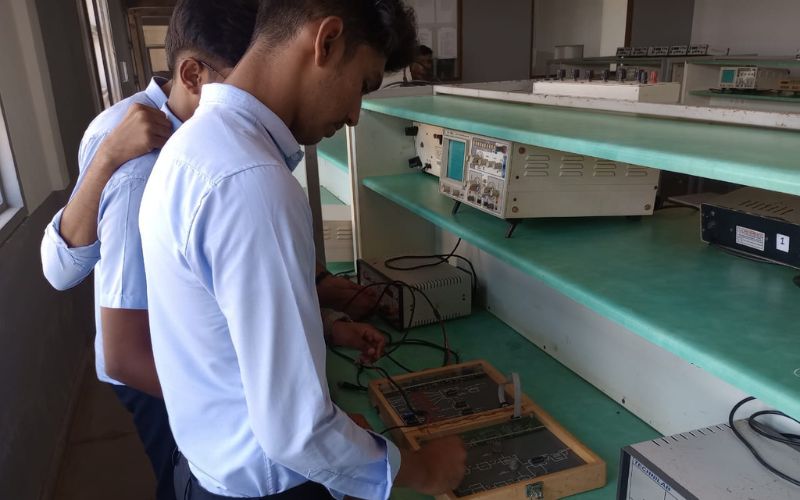
In this lab students become acquainted with oscilloscopes, signal generators and spectrum analyzers by conducting experiments. Measurement of common signals such as sinusoids and periodic square waves are conducted in both the time and frequency domain. The training and experience that ECE students gain in this laboratory enhance their understanding of analog and digital communication systems. The main components in the lab include TDM, ASK/FSK, PSK, DPSK, QPSK modulation and demodulation trainer kit, PCM with CODEC chip.
8. Microwave Engineering Laboratory
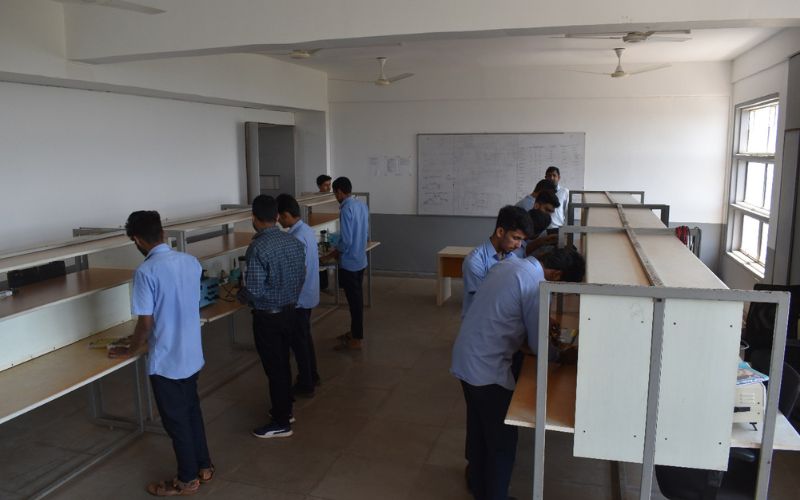
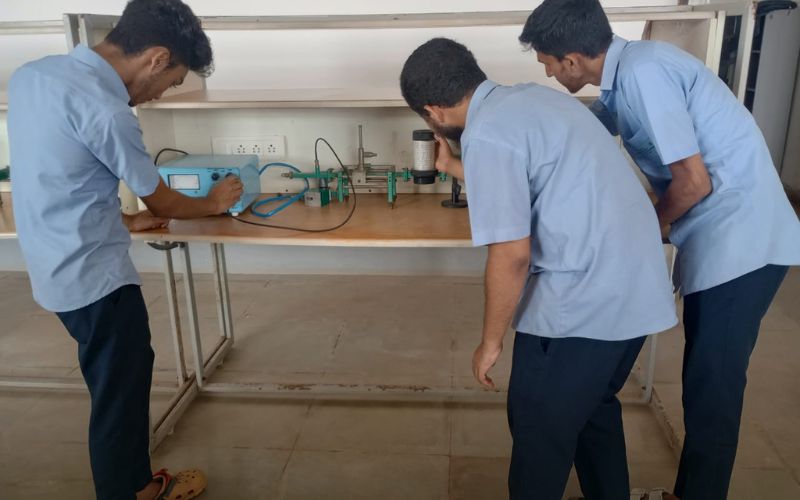
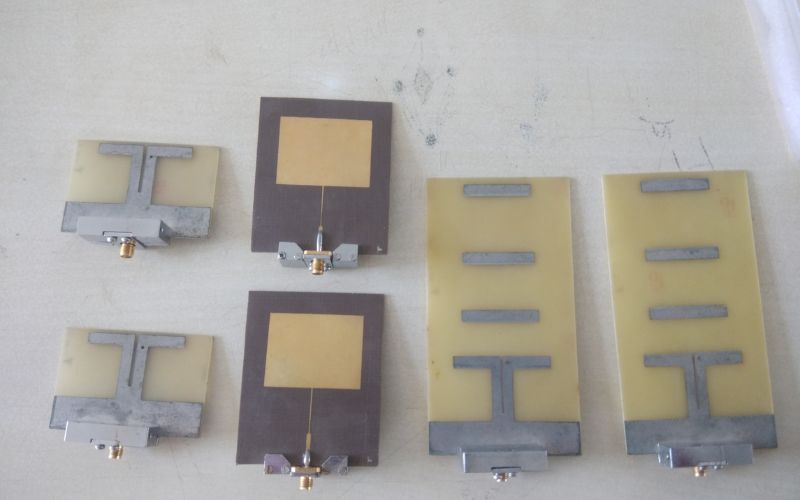
This laboratory aims at practical experience with the process of the microwaves in the microwave transmission lines. Experiments cover the propagation of the electromagnetic waves in the waveguide at microwave frequency. The objective of this laboratory is to enable the students to acknowledge with various waveguide components. They can critically analyze the behavior of their implementation. The Microwave Lab supports intermediate and advanced programs in Electromagnetics and Microwave Engineering. Students experiment with transmission line propagation, antennas and microwave circuit components. The microwave laboratories provide the necessary hardware & software support for training the students in the area of RF and Microwave Engineering. It offers design, analysis and simulation of various components and devices to understand the basics of RF and microwave engineering. The main component of the laboratory include, Microwave Test bench (Klystron Based).
9. Project Laboratory
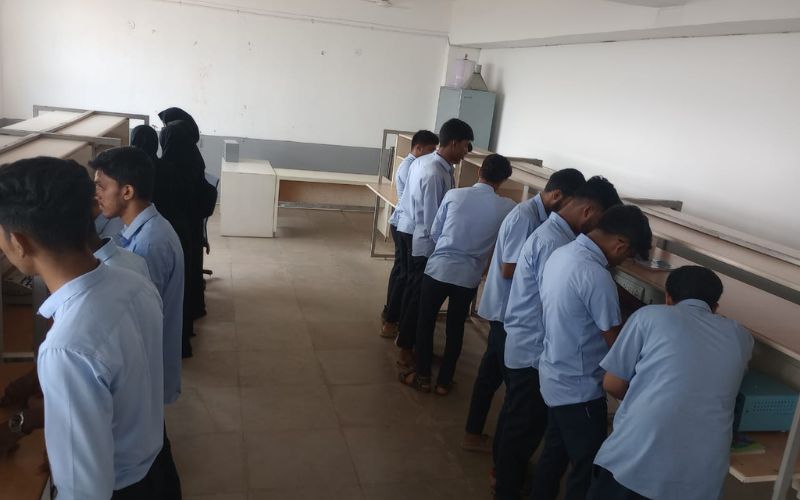
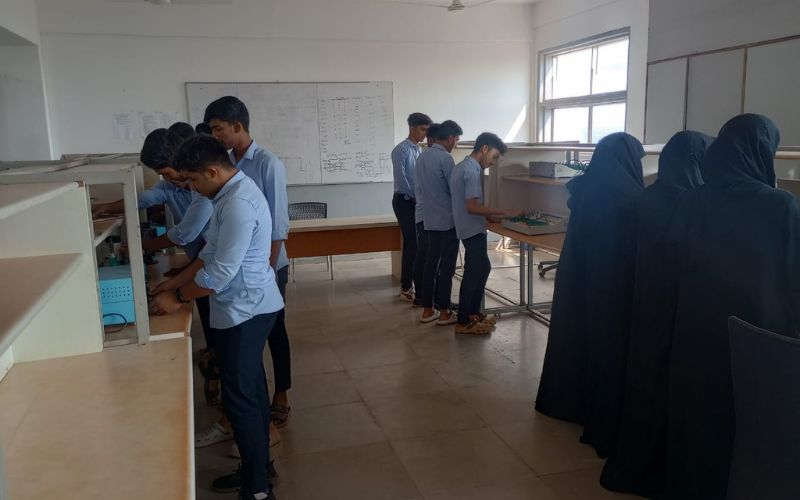
The primary purpose of the laboratory is to provide the space and resources needed by the students. The project laboratory of the department offers the students, the opportunity to gain valuable hands-on experience with state-of-the-art environment where students become proficient in both the physical and creative skills. The Project Laboratory has a key role in promoting practical learning experience, where students develop creative proposals, and execute their final projects. The main components of the lab include Transformers, breadboards, Power supplies, Components, Wattmeter, Ammeter, Voltmeter, Auto-Transformer, Oscilloscope.
EVENTS
Expert Session on VLSI Industry and IC Fabrication Held at BIT
The Department of Training & Placement and the Department of Electronics & Communication Engineering at Bearys Institute of Technology (BIT), in collaboration with the IEEE Mangalore Subsection and the IEEE BIT Student Branch, organized an insightful session on VLSI Industry and IC Fabrication at the National Seminar Hall.
Invited Talk on Data Protection and Cyber Security Held at BIT
The departments of Computer Science and Engineering (CSE) and Electronics and Communication Engineering (ECE), in association with the IEEE BIT Student Branch and the Institution’s Innovation Council, organized an insightful invited talk on “Global Data Protection Policy & Regulation” and “Cyber Security Architecture.
Industry-Ready Engineers: Skills the Tech World is Hiring For
Bearys Institute of Technology, under the banner of BIT IEEE Student Branch, organized an engaging and informative session titled “Industry-Ready Engineers: Skills the Tech World is Hiring For” at the International Seminar Hall.
Google Developer Group Inauguration at Bearys Institute of Technology
The Google Developer Group (GDG) was successfully inaugurated at Bearys Institute of Technology (BIT) in an event that showcased innovation, technology, and opportunities for student growth. The event was coordinated by Dr. Abdullah Gubbi, Head of the Electronics and Communication Engineering (ECE) Department.
Beach Cleaning by NSS Unit of BIT – 2024
On Sunday, December 15, 2024, the NSS unit of Bearys Institute of Technology (BIT), organised a Beach cleaning drive at Ullal Beach with the theme “Clean Beach and Green Beach.”
Project Exhibition for High School Students Organized by BIT IEEE Student Branch
Pavoor, December 14, 2024: The Department of Electronics and Communication Engineering (ECE) at Bearys Institute of Technology (BIT), in collaboration with the BIT IEEE Student Branch, organized a project exhibition for students from the Government High School, Pavoor. The event, held at BIT’s ECE Department, witnessed enthusiastic participation from around 60 high school students.
Food Gala organised at department of electronics and communication engineering
As part of the Social Connect and Responsibility curriculum, the Electronics and Communication Engineering Department organized a vibrant and flavorful Food Gala on December 4, 2024. The event aimed to foster community spirit, encourage teamwork, and nurture a sense of responsibility among students.
Workshop on Mastering Data and Machine Learning with RapidMiner Held at BIT
The Department of Electronics and Communication Engineering, in collaboration with the IEEE BIT Student Branch and IEEE Bangalore Section, organized a hands-on workshop titled “Mastering Data and Machine Learning Processes with RapidMiner” on December 3, 2024.
Community Clean-Up Drive Organized by BIT NSS Unit at Boliyar Village
The NSS Unit of BIT, in association with the Boliyar Village Panchayat and under the banner of Brahat Swachata Abhiyan , successfully conducted a Community Clean-Up Drive on 26th November 2024 at Boliyar Village.
One Day Session on “NBA and OBE”
IQAC-BIT organized a one-day session on “NBA and OBE” on 13-11-2024. The resource person for the event was Mrs. Roopashree, Assistant Professor and NBA Coordinator, Department of Electronics and Communication, Sahyadri College of Engineering and Management.
Disaster Awareness Event at Bearys Institute of Technology
The Disaster Awareness event, organized by the Department of Electronics and Communication Engineering at Bearys Institute of Technology (BIT) with IEEE Mangalore Subsection, took place on November 7, 2024, at the International Seminar Hall.
Beaspire Electronics and Communication Engineering Student Association Inaugurated at Bearys Institute of Technology
Mangalore, October 3, 2024 – The Department of Electronics and Communication Engineering (ECE) at Bearys Institute of Technology (BIT) inaugurated its student association, Beaspire, with great enthusiasm. The event, held at International Seminar Hall with inspiring keynote address by Prof. Suprabha K. R. from NITK, Suratkal, who shared her insights on entrepreneurship and leadership with a packed audience of students and faculty members.
Vibrant Engineers’ Day Celebrations at BIT
On September 17, 2024, Bearys Institute of Technology (BIT) celebrated Engineers’ Day with enthusiasm, honoring the invaluable contributions of engineers to society.
ECE student presents a paper at International conference
Mohammed Junaid Raza with Professor Nikhitha.C of ECE Participated and presented a paper in International Conference held on 11th sept-2024 at VCET, Puttur, DK (dist).
Teacher’s Day Celebration in the Department of Electronics and Communication Engineering
On the 5th of September, the 5th-semester students celebrated Teachers’ Day with great enthusiasm under the banner of their student association, Beaspire.
Recent Trends and Career Opportunities in VLSI Design
The Department of Training and Placement in association with the Department of Electronics and Communication Engineering, conducted a session for ECE students entitled “Recent Trends and Career Opportunities in VLSI Design.” on July 13, 2024.
Unlocking Learning Potential with Salesforce
The Department of Training and Placement in association with Department of Computer Science and Engineering organized a session on Unlocking Learning Potential with Salesforce for Final Year CSE and ECE students. Mr. Mohammed Shahid, Treasurer of BIT – Alumni Association, who is working as a Team Lead in Novigo Solutions Pvt Ltd, Mangalore was the Resource Person. Being an experienced Salesforce Specialist, he gave a thorough explanation on how Salesforce can be one of the career opportunities for freshers.
Inaugural ceremony of the National Service Scheme (NSS) at Bearys Integrated Pre-University College
The inaugural ceremony of the National Service Scheme (NSS) at Bearys Integrated Pre-University College took place on August 28, 2024, marking a significant milestone in the college’s commitment to community engagement. The program was dedicated to highlighting the vital role that youth play in nation-building and in contributing to societal well-being.
Industrial Visit of 3rd Semester ECE Students to IPCS Global and COMEDKARES
The Department of Electronics and Communication Engineering (ECE) organized an industrial visit for the 3rd-semester students to IPCS Global and COMEDKARES on August 28, 2024.
Scholarly research initiation by Prof. Jeevan
The Department of Electronics and Communication Engineering (ECE) at BIT recently organized a special event titled “Scholarly Research Initiation” to honor Prof. Jeevan as he embarks on his journey to pursue a PhD at Manipal University. This event was a collaborative effort by both students and staff, reflecting the strong sense of community and support within the department.
Dr. Abdullah Gubbi
1. Abdullah Gubbi, Mohammad Fazle Azeem, Nishatbanu ZH Nayakwadi, “Face recognition using local ternary pattern and booth’s algorithm”, 2014 3rd International Conference on Eco-friendly Computing and Communication Systems, Pages: 56-60, IEEE, 2014/12/18.
2. Abdullah Gubbi, M Deeksha, “Design and analysis of novel fuzzifer circuits in cmos current mode approach”, 2016 International Conference on VLSI Systems, Architectures, Technology and Applications (VLSI-SATA), Pages: 1-6, 2016/1/10.
3. Abdullah Gubbi, Mohammed Fazle Azeem, Zahid Ansari, “New Fuzzy LBP Features for Face Recognition”, arXiv preprint arXiv:1509.06853, 2015/9/23.
4. Abdullah Gubbi, Madasu Hanmandlu, Mohammad Fazle Azeem, “A novel LBP fuzzy feature extraction method for face recognition”, 2013 Annual IEEE India Conference (INDICON), Pages: 1-5, 2013/12/13.
5. Nagaraj Shet, C Shreesha, PV Rao, Abdullah Gubbi, “Low-Cost Appliance Control System for Home Automation and Energy Management Using Image Processing”, Artificial Intelligence and Evolutionary Computations in Engineering Systems: Proceedings of ICAIECES 2015, Pages: 125-134, 2016.
6. Abdullah Gubbi, “Four transistor comparator based PWM for DC-DC Converters”, 2015 1st International Conference on Next Generation Computing Technologies (NGCT), Pages: 536-539, 2015/9/4.
7. Abdullah Gubbi, Mohammad Fazel Azeem, “Type-2 Fuzzy Logic for edge Detection of Gray Scale Images”, Fuzzy Inference System-Theory and Applications, IntechOpen, 2012/5/9.
8. Jamil Ahmed Sk, Manjunath Prasad, Abdullah Gubbi, Hasibur Rahman, “Active Learning of constraints using incremental approach in semi-supervised clustering”, Int. J. Comput. Sci. Inf. Technol, Volume 6, Issue 2, Pages: 1962-1964, 2015.
9. Abdullah Gubbi, Mohammad Fazle Azeem, M Sharmila Kumari, “Non Binary Local Gradient Contours for Face Recognition”, arXiv preprint arXiv:1411.0442, 2014/11/3.
10. Ahmed Rimaz Faizabadi Abdullah Gubbi, Manjur Basha SI, Afsar Baig M, “Information Set based Local Directional Number for Face Recognition”, Turkish Journal of Computer and Mathematics Education (TURCOMAT), Volume 12, Issue 10, 2021.
11. Shoaib Kamal Abdullah Gubbi, Mohammad Fazle Azeem, Mohammed Rafeeq, “Fuzzy Shannon Entropy for Face Recognition”, International Journal of Innovative Technology and Exploring Engineering, Volume 8, Issue- 6S4, Blue Eyes Intelligence Engineering & Sciences Publication, 2019/4.
12. Abdullah Gubbi, Mohammad Fazle Azeem, NZH Nayakwadi, “Conventional entropy quantifier and modified entropy quantifiers for face recognition”, Procedia Computer Science, Volume 46, Pages: 1529-1536, Publisher: Elsevier, 2015/1/1.
13. E Gopika Gopinath, Abdullah Gubbi, “Four Transistor Comparator based PWM for DC-DC Converters”.
14. VN Roshna, Abdullah Gubbi, “High Quality Depth Map Reconstruction from Sparse Samples using Alternating Direction Method of Multipliers”.
15. Appannagouda Chandana BR Abdullah Gubbi, “Noise Estimation in Single Channel Speech Enhancement Using FFT ”.
Fathimath Fameeza
Fameeza, F. (2021). MRI Knee Pain Classification Using CNN Algorithm and Segmentation Using Clustering Algorithm. Turkish Journal of Computer and Mathematics Education, 12(10), 306-315.
Dr. S I Manjur Basha
1. Dr. Abdullah Gubbia, Dr. Manjur Basha S I, “Information Set based Local Directional Number for Face Recognition”, TURCOMAT, e-ISSN 1309-4653, 2021.
2. Lavanya, M. & Revathi, R. & Rajesh, Jegatheesan & Basha, S.I.Manjur. (2012). Efficiency enhancement of PV panel using soft computing based seeker optimization algorithm and seven level inverter configuration. International Conference on Intelligent Systems Design and Applications, ISDA. 269-273. 10.1109/ISDA.2012.6416549.
Mr. Abdul Jabbar H
1. Mubeena Parveen Taj, Abdul Jabbar, Ajesh, Prashanth Kumar, “IOT BASED INTELLIGENT FARMING”, JETIR, ISSN-2349-5162, 2019.
Mr. Jeevan N D
1. Jeevan N D, “Advanced PV System for domestic applications” International Journal of Innovative Research and Advanced Studies, ISSN 2394-4404, Volume: 5 Issue: 8, Published on August 2018.
Mr. Mehaboob Mujawar
Research Papers:
1. Mehaboob Mujawar, D.Vijaya Saradhi, Muhammad Ajmal Naz, Arjuna Muduli, “Design and Performance Comparison of Arrays of Circular, Square and Hexagonal Meta-material Structures for Wearable Applications” Journal of Magnetism and Magnetic Materials, ISSN 0304-8853, Volume: 553, Publisher: Elsevier, IF:2.993, Journal Ranking : Q2, Published on 1 July 2022. [https://doi.org/10.1016/j.jmmm.2022.169235]
2. Mehaboob Mujawar, T. Gunasekaran, D.Vijaya Saradhi, M.Venkateswararao “THz Microstrip Antenna Array Design for Cancer Detection Through THz Spectroscopy” AIP Proceedings of International Conference on Signal Processing And Communication Engineering Systems (SPACES-2021), organized by Signal Processing Research Group, Department of Electronics and Communication Engineering, K L Deemed to be University, Hyderabad, Telangana, 11th and 12th June 2021
3. Mehaboob Mujawar, D.Vijaya Saradhi, S.Lenin Desai, M.Venkateswararao “Performance Analysis of Dipole and Bow-Tie Antenna for Underwater Communication Using FEKO” 2021 IEEE Sponsored International Conference on Emerging Trends in Industry 4.0 (ETI 4.0), held at OP Jindal University, Raigarh, Chhattisgarh, India ,19th and 21st May 2021[Scopus Indexed]
4. Mehaboob Mujawar, T. Gunasekaran , Aiyas Rashid “Design and Analysis of X Band Pyramidal Horn Antenna using FEKO” 2021 First IEEE International Conference on Advances in Electrical , Computing , Communications and Sustainable Technologies (ICAECT), Shri Shankaracharya Group of Institutions, SSTC –Bhilai, Chhattisgarh, India ,19th and 20th February 2021
5. Mehaboob Mujawar “Design and Analysis of Log-Periodic Dipole antenna as a proximity fuse antenna” 2020 IEEE – International Conference on Industry 4.0 Technology (I4Tech), Vishwakarma Institute of technology –Pune, Maharashtra, India, 13th to 15th February 2020 [Scopus Indexed]
6. Mehaboob Mujawar , Sangam Borkar “Design and Implementation of Wireless security system for railway tracks” 2017 IEEE international conference , Saveetha Engineering College- Chennai, Tamil Nadu ,India 21st and 22nd September 2017
7. Mehaboob Mujawar, Vijaya Saradhi Dommeti “Design of Low Cost Active Noise Cancelling (ANC) Circuit using Ki-CAD” Springer proceedings of 9th International Conference on Innovations in Electronics and Communication Engineering (ICIECE-2021), Guru Nanak Institutions, Hyderabad, 13 – 14 August 2021
8. Mehaboob Mujawar, Aiyas Rashid, Jannisar Akhter Shah “Capacitive Touch Sensor to Control Home Appliances Using PIC16 Microcontroller” Springer proceedings of 3rd International Conference on Communication, Devices and Computing (ICCDC 2021), held on 16-18 August 2021, organized by the Dept. of Electronics and Communication Engineering, Haldia Institute of Technology, Haldia, WB, India.
9. Mehaboob Mujawar, T. Gunasekaran, Jonathan.M.Cansino “STEREO AUDIO AMPLIFIER BOARD USING TDA2822” 3rd Springer International Conference on Computational Science And Applications (ICCSA-2021), held on 10th -11th December 2021, organized by MIT world peace university – pune, India.
10. Mehaboob Mujawar, D.Vijaya Saradhi, K.Swetha “Stun Gun PCB Circuit with Arduino Power Shield”, Springer ICCDN-2021, held on 15th -16th December 2021, organized by Sikkim Manipal Institute of Technology, Sikkim, India.
11. Mehaboob Mujawar, Sangam Borkar “Advanced Niyantran” , International Conference on Research Development in Engineering Technologies ,Sciences and Business Management , Anveshana Educational and Research Foundation- Hyderabad , 8th April 2017.
12. Mehaboob Mujawar “COIL ANTENNA DESIGN FOR INDUSTRIAL AND SCIENTIFIC APPLICATIONS ” International Web Conference on Engineering , Science and Technology 2020 , Kumaraguru College of Technology , Coimbatore – Tamil Nadu , 30th June 2020
13. Mehaboob Mujawar “Headphone/Audio amplifier circuit on PCB using LM386” International E-Conference on “Bio-Electronics & Informatics in the Present Scenario: ECBI-2020”,at Shobhit Institute of Engineering & Technology (Deemed to – be University), Meerut – Uttar Pradesh , June 26-27, 2020.
14. [Best Paper Award] Mehaboob Mujawar “Modelling and design of 13.56 MHz Customized coil antenna for NFC using FEKO ” AICTE and CSIR Sponsored 11th National Conference on Emerging trends in instrumentation systems for smart cities , Sri Ramakrishna Engineering College- Coimbatore, Tamil Nadu , 12 and 13th December 2019
15. Mehaboob Mujawar, Sangam Borkar “Railway Track Fault Detection and Control” National Conference on “Recent Advancements in Electronics and Communication Engineering” SDM College of Engineering and Technology – Dharwad , Karnataka , 8th October 2016
16. Mehaboob Mujawar , Aiyas Rashid “Design of Ultra Wide Band Antenna” National Conference on Recent Technologjes in Engineering and Basic Sciences – 2020 (NCRTEBS-2020) Bonam Venkata Chalamayya Engineering College ( Autonomous). Odalarevu , Andhra Pradesh , 16th July 2020.
17. Mehaboob Mujawar , “TIME IN TIME OUT” 9th annual National symposium on “ VLSI and Embedded system” Organized by Goa university at Carmel college nuvem , 11th April – 2015
18. Mehaboob Mujawar “TITO” Sparx 2015- Paper Presentation Event Goa college of Engineering ponda 24th and 25th march 2015.
19. Mehaboob Mujawar , Piyal Saha , “ Energy Efficient Smart Lighting system ” Zeichen Journal – UGC CARE – Group II Journal , Volume 6 , Issue 6, ISSN 0932-4747 Page: 30-35 , June 2020
20. Mehaboob Mujawar , “Design and Implementation of 12V, 1A Switched Mode Power Supply On PCB using Ki_CAD ” , Journal of Engineering Sciences [ JES ] UGC CARE Journal , Volume 11 , Issue 5, ISSN 0377-9254 , Page:119-123 , May 2020.
21. Mehaboob Mujawar , “Design of Bike Intercom Voice-Over Electronic Circuit System Using Ki-Cad ”, JOURNAL OF SCIENCE, COMPUTING AND ENGINEERING RESEARCH (Open Access Quality Publication of Double-Blind Peer Reviewed International Journal) (ISSN: 2708-1079) Volume 1, Issue 2
22. Mehaboob Mujawar , “Design of Compact and Cost-effective Automatic Sanitizer Dispenser Machine ” Cape Comorin: An International Multidisciplinary Double-Blind Peer-reviewed Research Journal , Volume 2 , Issue 4 , ISSN 2582 – 1962 Page: 13- 17 , May – 2020
23. Mehaboob Mujawar , “ Advanced Security system for railway tracks” International Journal of scientific and Engineering research , Volume 8, Issue 7, ISSN 2229-5518 , July – 2017
24. Mehaboob Mujawar , “Design of reliable electronic door lock system on PCB using Ki-CAD ” International Journal of Microelectronics and Digital Integrated Circuits , STM Journals /Journals Pub , Volume 6, Issue 1, ISSN 2456-3986, Page: 34 – 38 , 2020
25. Mehaboob Mujawar , “Implementation of Frugal Solution for Water Level Detector in Reservoir , Industrial and Agricultural Applications ” International Journal of power electronics controllers and converters , STM Journals /Journals Pub, Volume 6, Issue 1, ISSN 2456-1614, Page: 29 – 34 , 2020
26. Mehaboob Mujawar , “4-Channel Relay Driver Circuit and PCB Design” International Journal of Microelectronics and Digital Integrated Circuits ,STM Journals /Journals Pub ,Volume 6, Issue 1, ISSN 2456-3986, Page: 1 – 7 , 2020
27. Mehaboob Mujawar , “Design and development of Economical mobile signal jammer” International Journal of Electrical power system and technology , STM Journals /Journals Pub, Volume 6, Issue 1, ISSN 2455-7293, Page: 10 – 17 , 2020.
28. Mehaboob Mujawar , “ Planar UWB Antenna for 5 GHz ISM Band ” Journal of Microwave Engineering and Technologies , STM Journals , Volume 7, Issue 2, ISSN 2349-9001, Page: 1-6 , June – 2020.
Book chapters:
1. Mehaboob Mujawar, Subuh Pramono “Textile Based Wearable Antenna for Wireless Applications”, Chapter No:15 , Name of the Book : Printed Antenna, Design and Challenges, CRC Press, Taylor and Francis Group, Page no: 235-247, ISBN: 9781003347057, Year: 2022. [DOI:10.1201/9781003347057-15]
2. Mehaboob Mujawar, “Arrow Shaped Dual-Band Wearable Antenna for ISM Application”, Chapter No:08, Name of the Book : Wearable and Neuronic Antennas for Medical and Wireless Applications , Wiley-Scrivener Publications , Page no: 163-175, ISBN:978-1-119-79180-5, D.O.P: 06 May 2022. [ https://doi.org/10.1002/9781119792581.ch8]
3. Mehaboob Mujawar and T.Gunasekaran, “Effect of Encapsulating Materials on Monopole Antenna Performance for Underwater Communication”, Chapter No: 04, Name of the Book : Smart Antenna : Latest trends in design and application, Springer and EAI, Page no:35-42, Print ISBN: 978-3-030-76635-1, Online ISBN: 978-3-030-76636-8, Published on 01 January 2022.
4. Mehaboob Mujawar and T.Gunasekaran, “Multi-band Slot Microstrip Antenna for Wireless Applications”, Chapter No: 03, Name of the Book : Smart Antenna : Latest trends in design and application, Springer and EAI ,Page no: 23-34, Print ISBN: 978-3-030-76635-1, Online ISBN: 978-3-030-76636-8, Published on 01 January 2022
5. Mehaboob Mujawar , “Antenna Array Design for Massive MIMO system in 5G applications”, Chapter No:18, Name of the Book :Future Trends in 5G and 6G : Challenges, Architecture , and Applications , CRC Press, Taylor and Francis Group , Page no: 321-326 , ISBN: 978-1-003-175-15, eISBN: 9781003175155, Year:2021
6. Mehaboob Mujawar, “Multi-Band Fractal Antenna For Wearable Applications”, Chapter No:01, Name of the Book : Planar Antenna: Design, Fabrication, Testing and Application, Nova Science Publisher, USA, Page no: 1-16, ISBN:978-1-536-19898-0, Year: 2021
7. Mehaboob Mujawar, “Compact Microstrip Patch Antenna Design with Three I , Two L , One E and one F shaped patch for wireless applications” Chapter No: 05, Name of the Book : Microstrip Antenna Design for Wireless Application, CRC Press, Taylor and Francis Group, Page no: 57 – 68, ISBN: 9781000417913, 1000417913, Published on 30 November 2021.
Books:
1. Mehaboob Mujawar, Subuh Pramono, “Introduction to Analog Communication Systems”, Redshine Publications Sweden, Year: 2022, ISBN: 978-91-987662-3-3 (International Publisher)
2. Mehaboob Mujawar, Jafar A. Alzubi “Fundamentals of Mobile Communication”, Redshine Publications Sweden, Year: 2022, ISBN: 978-91-987662-00505-5 (International Publisher)
3. Mehaboob Mujawar, D. Vijaya Saradhi “PCB Design of Electronic Systems for Emerging Applications ”, Weser Books , Germany, Year: 2021, ISBN: 978-3-96492-297-7 (International Publisher).
4. Mehaboob Mujawar, Dr.T.Gunasekaran “Electronic System Design and Engineering – A Practical Approach”, INSC International Publishers, India, Year: 2021, ISBN: 978-1-68576-108-0 (International Publisher)
Mr. Sujay K
1. Sujay K, Mahesha Y “Design of canonical signed digit multiplier using spurious power suppression technique adder” National Conference on Advances in Communication and Signal processing NCACSP – 2017., organized by Department of Electronics and Communication Engineering, St. joseph engineering college, Mangalore, September 2017.
Mrs. Mubeena Parveen
1. Mubeena Parveen Taj, Ajesh “IOT based automatic medical herbs monitoring and controlling” IJERCSE, ISSN (Online) 2394-2320, 2021.
2. Mubeena Parveen Taj, Abdul Jabbar, Ajesh, Prashanth Kumar, “IOT BASED INTELLIGENT FARMING”, JETIR, ISSN-2349-5162, 2019.

